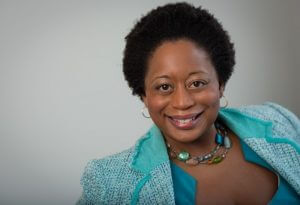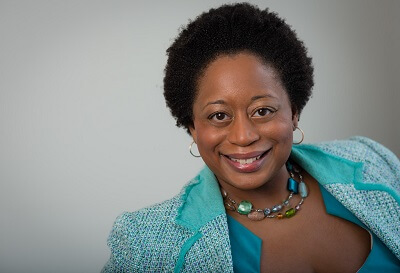An Interview with Amanda Misiko Andere, CEO, Funders Together to End Homelessness
Racial Justice Leader
@AmandaAndere
Tell me about your current role?

In February I hit my four-year mark as CEO of Funders Together to End Homelessness, a national network of over 240 members including all types of foundations—private, operating, family, community—as well as individual donors, corporate giving programs, and United Ways, working to prevent and end homelessness. We recently updated our mission and vision statements to address racial equity in all programming and work by centering racial equity analysis and showing grantmakers how to show up in community with a racial equity lens.
What was the impetus to explicitly center racial equity?
In October 2016 before the world changed dramatically for some, our board undertook strategic planning and named racial equity as something to lift up and address. I joined the organization in February 2016 and through the end of 2016 the staff and board of a mostly white organization wasn’t talking about the standard stuff like whether to have more meetings. I came to an organization where white leaders and white staff had already done a lot of their own work. Partners and colleagues at SPARC Initiative had started to research and lift up race, racism and inequities in the homelessness system. There is lots of published data on the disparities but no one was really naming and addressing them. The movement was having a different conversation and with my leadership and the leadership of my board we could lift up a conversation with funders in a different way.
As a membership organization, internal work can be externally facing. We are on a journey with our members to address structural racism and have just as much to learn. It became clear that to engage members in conversations that racial equity wasn’t something to talk about on the side. We developed a race/structural racism community of practice which is a two-year learning to action program asking how grantmakers can end homelessness with a racial equity lens as well a standing committee of our board to address racial equity. A board member called out that we had centered the word but hadn’t codified it in our mission and vision. We share a unique point of view and aren’t just a network where funders can come and learn. Yes, we are a welcoming big tent, but we have a point of view. There is a continuum of where folks are and we are thinking from a systems change lens to push advocacy and policy.
What are some of your career highlights?
I ran a national organization called Wider Opportunities for Women which faced some challenges and ultimately many programs merged with other organizations. I took over the organization and had to shut it down which I don’t deem a failure but a highlight. Testing our understanding of what success looks like means being a leader who can bear some truths and push through. I’ve had roles where I have had to rebuild something…where people didn’t think the organization would survive, yet I made it successful. Coming to Wider Opportunities I was continuing to be the Olivia Pope of struggling nonprofits. (Laughter.)
I had thought I’d get into politics and do campaign work and worked on The Hill briefly. I was amazed by organizations on the ground doing policy and advocacy work and then I fell into development work. I noted a lot of organizations lacked the capacity to do policy work and wanted to build this capacity in services, policies, and voice.
If there was a headline for your leadership journey throughout your career, what would it be?
Personally, I think it is that blessings are in breakings. You have to go through some things to really understand who you are and where you need growth. That the path you think you will take is not always what’s determined for you. There are blessings in breakings.
If there was a soundtrack of greatest hits related to your career, what songs would make the list?
Janet Jackson’s Rhythm Nation. Released in 1984, the songs of justice, love, struggle, and joy are still relevant to my purpose-filled life today.
Work in the social sector can be very personal and linked to one’s values. Can you think of a time when your values were in tension and how you reconciled that tension or not?
Especially being in philanthropy and building capacity as a philanthropy serving organization, values are in tension if I’m thinking about racial justice and racial equity and realize that the money I’m seeking is rooted in structural racism and capitalism; there’s inherent conflict with the issues I’m fighting for. All money is bad money; it’s just what you ultimately do with it. You have to have some personal integrity or parameters and understand where those limits are. Working with funders or grant funding from institutions who have been a big part of housing crisis – whether banks or institutions. There are corporations who have displaced housing in black communities or have questionable pay equity. It’s a constant moral struggle that is bigger and deeper than one particular issue. What does it mean to build power to stand up to some of those resource power hubs that aren’t rooted in racial justice and racial equity?
What are your favorite types of challenges?
Those that really struggle with how to change the way leaders think, respond and act. I don’t like to fix widgets; I prefer big systems change. Getting leaders who have been thinking a certain way about the nonprofit industrial complex and helping them to start to see how they have a role in changing it. I like dealing with the interpersonal and the structural.
Can you share an experience in the workplace where you have had to reclaim your time? What was the context? How did you navigate it? What was the outcome?
Every damn day. (Laughter.) I think I have been on a mission to help white leaders recognize that they have a responsibility in naming the lack of diversity in panels or speaking engagements. It’s not just reclaiming my time but that of leaders and people of color who are often talked about yet not in dialogue with. A big part of my journey the last two years has been to just say the thing. As leaders of color we might have side conversations, but I now say no more white panels; no conversations about us without us.
We come from a resilient and strong lineage. How would you describe the type of ancestor you want to be and why?
I want to be the type of ancestor who is constantly pushing the next generation to lean on its faith. I didn’t quite understand that phrase when my pastor would tell me to lean on my faith. I came to realize that people had been through similar situations and it was a reminder that you do not have to do this alone; you have the strength of people to lean on and the strength of your faith.
What’s your approach to self-care?
Radical self-care looks like canceling two trips. I typically travel a lot – almost every week – and decided that I don’t need to show up to everything. I choose a word of the year and this year my word is surrender…surrendering to situations and not having to control everything. I can have massages and rest days but if I don’t tap into others to do their part then I still carry that burden. I have a unique role and part of that is allowing others to step up where they are supposed to lead.
What advice would you offer other Black women trying to develop or amplify their voice and become better self-advocates?
Number one is to do a lot of reflection on what your truth is and what ways you are willing to be a co-conspirator for yourself and others and when you’re willing to put something on the line. As Black women we have a lot of opportunities to lead and be in leadership positions, but struggle with when to speak up and how to speak up. You can only do that with lots of reflection on your principles and your core. There are different strategies to use your voice which require inward work.
If you could change the social sector in a way that would benefit, lift up, or affirm Black women, what would that change be?
Pay Black women for our time and mental energy. Beyond pay, change the way we create spaces for leadership and influence and recognize that a lot of power hoarding happens in white dominant spaces especially with white women. Back to my earlier point about the work that white leaders need to do, it’s not just about sharing power but allowing women to lead in their intuitive ways to break down barriers and solve problems.


